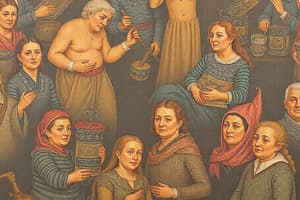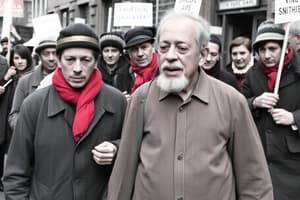Podcast
Questions and Answers
Which perspective focuses on artistic and intellectual activity in cultural studies?
Which perspective focuses on artistic and intellectual activity in cultural studies?
- Anthropologists
- Historians
- Sociologists
- Humanities (correct)
Cultural studies solely focus on historical documents for understanding culture.
Cultural studies solely focus on historical documents for understanding culture.
False (B)
What is the process called through which culture is learned?
What is the process called through which culture is learned?
socialization
Cultural studies use key theories, concepts, and arguments to analyze and understand real-world situations and ___.
Cultural studies use key theories, concepts, and arguments to analyze and understand real-world situations and ___.
Match the following academic disciplines with their focus in cultural studies:
Match the following academic disciplines with their focus in cultural studies:
Which of the following is a key outcome of today's lesson on cultural studies?
Which of the following is a key outcome of today's lesson on cultural studies?
Cultural studies is limited to the analysis of contemporary issues.
Cultural studies is limited to the analysis of contemporary issues.
Name one issue that cultural studies might focus on.
Name one issue that cultural studies might focus on.
What is the primary influence in primary socialization?
What is the primary influence in primary socialization?
Secondary socialization occurs only during childhood.
Secondary socialization occurs only during childhood.
Name the two stages of socialization according to sociologists.
Name the two stages of socialization according to sociologists.
___ refers to the gender roles defined as masculine or feminine in different societies.
___ refers to the gender roles defined as masculine or feminine in different societies.
Match the concepts with their respective fields:
Match the concepts with their respective fields:
Flashcards
Primary Socialization
Primary Socialization
The early stage of socialization, primarily within the family, shaping language and gender identity.
Secondary Socialization
Secondary Socialization
Socialization occurring outside the family, influencing individuals throughout life.
Gender
Gender
Social roles, often masculine or feminine within different societies.
Sexuality
Sexuality
Signup and view all the flashcards
Socialization
Socialization
Signup and view all the flashcards
Cultural Studies
Cultural Studies
Signup and view all the flashcards
Theorizing Culture
Theorizing Culture
Signup and view all the flashcards
Study of Culture
Study of Culture
Signup and view all the flashcards
Humanities Approach
Humanities Approach
Signup and view all the flashcards
Anthropological/Sociological Approach
Anthropological/Sociological Approach
Signup and view all the flashcards
Historical Approach
Historical Approach
Signup and view all the flashcards
Socialization
Socialization
Signup and view all the flashcards
Cultural Perspective
Cultural Perspective
Signup and view all the flashcards
Study Notes
Cultural Studies (HUSCA2-44)
- Eduvos (Pty) Ltd, formerly Pearson Institute of Higher Education, is registered with the Department of Higher Education and Training.
- Registration Certificate number: 2001/HE07/008
- Course registered under Higher Education Act, 101, of 1997.
Week 1: Introduction
- Learning Outcome 1.2: Argue convincingly for or against theses within cultural studies.
- Learning Outcome 1.3: Apply central theories, concepts, and arguments of cultural studies to real-life situations and examples.
Week 1, Lesson 1
- Today's lesson covers: Issues and problems in the study of culture, and theorizing culture.
- Theorizing Culture: Use key theories, concepts, and arguments from cultural studies to analyze and understand real-world situations and examples.
Issues and Problems in the Study of Culture
- The study of culture has been approached from various perspectives historically.
- Humanities: Focus on artistic and intellectual activity.
- Anthropologists & Sociologists: Examine ways of life.
- Historians: Study the development of culture using historical documents.
How Do People Become Part of a Culture?
- Culture is learned through a process called socialization.
- Primary Socialization: Occurs in the family, shaping language and gender identity.
- Secondary Socialization: Influences from outside the family throughout a lifetime.
Gender and Sexuality in Culture
- Gender: Social roles defined as masculine or feminine in different societies.
- Sexuality: Desires and sexual orientation of individuals.
- Freud's Theory: Gender and sexual preferences are products of conditioning, not biology
Understanding Meaning in Culture
- Meaning in culture is socially constructed, influenced by social locations and interactions.
- Perspectives differ based on class, gender, and other social roles.
Socially Constructed Knowledge
- Sociology of Knowledge: Explores how our understanding of the world is shaped by social location.
- A working-class person's view of the world may differ from an upper-class person's.
- Knowledge can be socially constructed, not necessarily "true."
- Cultural studies examine knowledge through the lens of society and social structures.
Understanding the Past Through Culture
- Culture is often viewed through tradition.
- Positive view: National traditions reflect deep-rooted cultural heritage.
- Negative view: Describing non-European cultures as "traditional" often implies backwardness, especially in modern contexts.
- Cultural studies challenge these assumptions.
Traditions as Cultural Constructions
- Traditions are not neutral or objective.
- They are constructed and reconstructed based on societal needs.
- Example: The kilt as a Scottish tradition.
The Evolution of Cultural Symbols
- The meaning of cultural symbols changes over time.
- Example: The kilt in Scotland (1950s: viewed as passé or effeminate; recent times: a symbol of nationalism and pride).
Historical and Cultural Relativism
- Historical Relativism: Can we understand past cultures the way they did?
- Example: Difficulty in grasping what Highland dress meant.
- Cultural Relativism: Can we understand other cultures without imposing our biases?
- Example: Misunderstanding Azande beliefs or Trobriand Islanders' concept of time.
Challenges of Cross-Cultural Understanding
- Perceptual Relativism: Do we see the same things as others when observing different cultures?
- How does language and context affect communication?
- Example: Deborah Tannen's research on gender communication (men and women's conversational styles are as distinct as cross-cultural communication).
Cultural Interactions: More Than Just Boundaries
- Interactions between colonizers and indigenous people.
- Example: Trobriand Islanders adapted cricket into their war traditions.
Culture in a Globalized World
- Cultural symbols take on new meanings in different places.
- Example: Coca-Cola in India (symbol of neocolonialism) versus the UK (represents personal freedom for British Asian youth).
Power and the Valuation of Culture
- Certain cultural forms are valued over others.
- Example: High culture (e.g., Shakespeare), versus mass culture (e.g., popular media).
- These distinctions are often constructed and reflect power dynamics.
Cultural Change and Continuity
- Boundaries between high and popular culture are dissolving.
- Example: Opera's rise in popularity in the UK after the 1990 World Cup.
Culture and Power
- Culture is shaped by power (a product of social interactions, influenced by political and economic systems).
- Power distribution: Authority and resources are unequally distributed in societies, affecting cultural formation.
- Dominant groups use culture to explain, validate, and maintain their positions.
Culture and Tradition
- Traditions are constructed and often promoted by dominant groups to serve their interests.
- Exclusion of alternatives (other forms of governance, democracy, and cultural expressions) are marginalized.
- Example: British parliamentary democracy tradition excludes other organizational models.
Marginalization of Voices
- Cultural exclusion: Dominant narratives in English literature marginalize minority voices.
- Popular culture: Often dismissed by elites as "trash" to undermine value for oppressed groups.
Culture as Control: Indoctrination
- Popular culture can serve as a tool for control, promoting passivity.
- Frankfurt School's view: Mass culture is used to create conformity.
- Example: Media as a tool of control, the relationship between celebrities and fans.
Example - Media and Celebrities
- The relationship between celebrities and fans mirrors totalitarian dynamics.
- Example: Fan culture reflects ritualized acts of submission and conformity to authority.
Culture and Politics
- Culture and power are interconnected.
- Cultural studies must analyze political and power relations.
- Understanding how culture relates to power is essential for understanding societies.
Activi (Activities)
- Challenges in the study of culture: researchers face challenges concerning representation, bias, and interpretation.
- Issues in studying different cultures: including different languages, translations, and historical contexts.
- Methodologies for respecting cultural diversity: ensuring interpretations respect cultural diversity without imposing external values or assumptions.
- Further questions to explore: combining multiple theories to give a more comprehensive view of culture; how global influences (migration, media, or technology) challenge traditional theories of culture.
Defining Social Structure
- Social structure: The enduring, patterned relationships between elements of society.
- Analogy: Like the girders of a building, social structures hold society together.
Culture and Social Conflict
- Karl Marx: Culture is shaped by power and inequality. Dominant class controls ideas and values to maintain power.
- Max Weber: Beliefs and behavior are products of economic and political factors.
Talcott Parsons' Functionalism
- Culture is necessary for social order.
- Culture provides values and norms, shaping societal stability.
- Example: Values like prosperity and justice.
- Culture's function: Internalized by individuals, maintained by institutions (e.g., economy, politics).
Feminist Perspectives on Culture
- Gender Conflict: Culture reflects inequality between men and women.
- Patriarchy: Dominates cultural roles and expectations.
- Focus: Culture as a site of reproduction for gender inequality.
Race and Racism in Culture
- Race is a social construct. Differences within groups are as great as between groups.
- Racism: Articulates cultural differences to validate oppression.
- Historical context: European imperialism and the domination of colonized peoples.
Culture as a Force for Change
- Max Weber: Protestant ethic and capitalism. Beliefs shape economic practices, and capitalist growth, demonstrating how culture shapes social structures and brings change.
Michel Foucault and Power
- Culture, power, and knowledge are intertwined.
- Key concepts: Discourse, subjectivity, and how institutions shape identities.
- Impact: Political campaigns like prisoners' rights and gay rights.
Michel Foucault: Power, Knowledge, and Subjectivity
- Background: French philosopher and historian.
- Key Contributions: Relationship between power and knowledge; discourse shapes subjectivities.
- Legacy: Foucault's ideas have influenced studies of identity, power relations, and political activism.
Max Weber on Ideas and Social Change
- Weber's Argument: Ideas can influence historical development.
- Example: The Protestant Ethic and the Spirit of Capitalism.
- Key Insight: Culture (e.g., religious beliefs) shapes and is shaped by social structures.
Mary Douglas: Culture as a System
- Main Idea: Culture shapes understanding beyond material realities.
- Example: Dirt and hygiene are culturally constructed concepts.
- Cultural Systems: are shaped not just by material facts but by wider social and moral cosmologies.
Judith Butler: Gender Performativity
- Key Argument: Gender is performed, not a natural or essential attribute.
- Performance Theory: Cultural identities (including gender) are created through repeated social practices.
- Implication: Identities are fluid and shaped through cultural and social performances.
Gilles Deleuze and Félix Guattari: Rhizomatic Connections
- Culture and experience are interconnected without clear beginnings or ends.
- Ideas and identities form through ever-changing connections.
- Machinic Philosophy: Human beings are part of complex networks.
Culture as Performance and Politics
- Alexander's Analysis: Political success is often influenced by mass-mediated performances.
- Implication: Modern politics relies heavily on cultural performance over technical achievements.
Activi (Activities).
- Theorizing Culture: explores various frameworks to understand human behavior.
- Combining Theories: Combining various theoretical approaches can lead to a more comprehensive view of culture.
- Global Influences: global influences such as migration, media and technology challenge traditional theories of culture.
Conclusion: Dynamic Relationship Between Culture and Social Structure
- Functionalists: Culture as determined by social structure.
- Marxists & Feminists: Culture as shaped by class, race, and gender struggles.
- Foucault & Others: Culture and social identities are reciprocally shaped.
- Culture is dynamic and continuously influenced by performances, power structures, and ongoing societal changes.
Studying That Suits You
Use AI to generate personalized quizzes and flashcards to suit your learning preferences.




